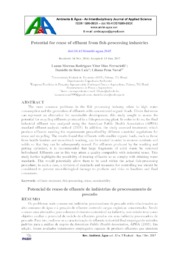Potential for reuse of effluent from fish-processing industries.
Potential for reuse of effluent from fish-processing industries.
Autoria: FERRACIOLLI, L. M. R. V. D.; LUIZ, D. de B.; NAVAL, L. P.
Resumo: The most common problems in the fish processing industry relate to high water consumption and the generation of effluents with concentrated organic loads. Given that reuse can represent an alternative for sustainable development, this study sought to assess the potential for recycling effluents produced in a fish-processing plant. In order to do so, the final industrial effluent was analyzed using the American Public Health Association (APHA) standard effluent-analysis method (2005). In addition, the study assessed treatments which produce effluents meeting the requirements prescribed by different countries' regulations for reuse and recycling. The results found that effluents with smaller organic loads, such as those from health barriers and monoblock washing, can be treated in order to remove nutrients and solids so that they can be subsequently reused. For effluents produced by the washing and gutting cylinders, it is recommended that large fragments of solid waste be removed beforehand. Effluents can in this way attain a quality compatible with industrial reuse. This study further highlights the possibility of treating effluents so as comply with drinking water standards. This would potentially allow them to be used within the actual fish-processing procedure; in such a case, a revision of standards and measures for controlling use should be considered to prevent microbiological damage to products and risks to handlers and final consumers.
Ano de publicação: 2017
Tipo de publicação: Artigo de periódico
Unidade: Embrapa Pesca e Aquicultura
Palavras-chave: Indústria, Peixe, Processamento de pescado, Reuso, Sustentabilidade, Tecnologia de alimento, Tratamento de efluente
Observações
1 - Por padrão são exibidas publicações dos últimos 20 anos. Para encontrar publicações mais antigas, configure o filtro ano de publicação, colocando o ano a partir do qual você deseja encontrar publicações. O filtro está na coluna da esquerda na busca acima.
2 - Para ler algumas publicações da Embrapa (apenas as que estão em formato ePub), é necessário ter, no celular ou computador, um desses softwares gratuitos. Sistemas Android: Google Play Livros; IOS: iBooks; Windows e Linux: software Calibre.
Acesse outras publicações
Acesse a Base de Dados da Pesquisa Agropecuária (BDPA) para consultar o acervo completo das bibliotecas da Embrapa.

